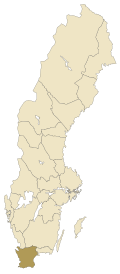Welcome to the Denmark Portal! | ||||

|

|

| |
Denmark is the smallest and southernmost of the Nordic countries. Unified in the 10th century, it is also the oldest. Located north of its only land neighbour, Germany, south-west of Sweden, and south of Norway, it is located in northern Europe. From a cultural point of view, Denmark belongs to the family of Scandinavian countries although it is not located on the Scandinavian Peninsula. The national capital is Copenhagen.
Denmark borders both the Baltic and the North Sea. The country consists of a large peninsula, Jutland, which borders Schleswig-Holstein; many islands, most notably Zealand, Funen, Vendsyssel-Thy, Lolland, and Bornholm; and hundreds of minor islands often referred to as the Danish Archipelago. Denmark has historically controlled the approach to the Baltic Sea, and those waters are also known as the Danish straits.
Denmark has been a constitutional monarchy since 1849 and is a parliamentary democracy. It became a member of the European Economic Community (now the European Union) in 1973. The Kingdom of Denmark also encompasses two off-shore territories, Greenland and the Faroe Islands, both of which enjoy wide-ranging home rule. The Danish monarchy is the oldest existing monarchy in Europe, and the national flag is the oldest state flag in continuous use.
Selected biography

Tycho Brahe, born Tyge Ottesen Brahe (December 14, 1546 – October 24, 1601), was a Danish nobleman astronomer as well as an astrologer and alchemist. He was granted an estate on the island of Hven and the funding to build the Uraniborg, an early research institute, where he built large astronomical instruments and took many careful measurements. As an astronomer, Tycho worked to combine what he saw as the geometrical benefits of the Copernican system with the philosophical benefits of the Ptolemaic system into his own model of the universe, the Tychonic system. From 1600 until his death in 1601, he was assisted by Johannes Kepler, who would later use Tycho's astronomical information to develop his own theories of astronomy.
He is credited with the most accurate astronomical observations of his time, and the data was used by his assistant Kepler to derive the laws of planetary motion. No one before Tycho had attempted to make so many redundant observations, and the mathematical tools to take advantage of them had not yet been developed. He did what others before him were unable or unwilling to do — to catalogue the planets and stars with enough accuracy so as to determine whether the Ptolemaic or Copernican system was more valid in describing the heavens.
Recently selected: Ludvig Holberg - Karen Blixen - Bertel Thorvaldsen
Selected picture
Selected article
Scanian was previously classified as a regional language by SIL International, but before the latest update, the Swedish representative to ISO/TC-37, the technical committee overseeing ISO 639, required that Scanian be removed from the ISO/DIS 639-3, the draft just prior to the final draft FDIS, or a positive vote from Sweden would not be forthcoming. The prior identifier ISO 639-3:scy, as used in the Ethnologue 15th edition, is reserved for Scanian, and may become active again if a request is submitted to have it reinstated during the annual review process. Within the previous SIL International classification of Scanian were the dialects in the province of Scania, some of the southern dialects of Halland (halländska in Swedish), the dialects of Blekinge (blekingska in Swedish) and the dialects of the Danish island of Bornholm (bornholmsk in Danish).
Selected place
With a population of 89,071 (1 January 2010), the Kolding municipality is the seventh largest in Denmark. The city itself has a population of 57,197 (1 January 2011) and is also the seventh largest city in Denmark.
Kolding is well known as the location of the former royal castle of Koldinghus which was built in the 13th century. The castle is now a museum and tourist attraction.
Categories
Denmark topics
Things you can do
- Expand stubs:
Geography stubs · People stubs · Denmark stubs in general
Help us extend these stubs and make them real articles!
- Categorize:
Help us categorize Denmark-related articles
- WikiProjects:
Have a look at WikiProject Denmark, WikiProject Faroe Islands, WikiProject Greenland and WikiProject Norse history and culture
- Noticeboard:
Have a look at the Danish Wikipedians' notice board
- Geotag:
Find coordinates for these locations and tag them: articles missing geocoordinate data
Related portals
Northern Europe
Other countries
Associated WikiMedia
The following Wikimedia Foundation sister projects provide more on this subject:
-
Commons
Free media repository -
Wikibooks
Free textbooks and manuals -
Wikidata
Free knowledge base -
Wikinews
Free-content news -
Wikiquote
Collection of quotations -
Wikisource
Free-content library -
Wikispecies
Directory of species -
Wikiversity
Free learning tools -
Wikivoyage
Free travel guide -
Wiktionary
Dictionary and thesaurus













